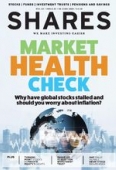Archived article
Please note that tax, investment, pension and ISA rules can change and the information and any views contained in this article may now be inaccurate.
How the ‘Heineken Index’ can refresh your returns

Since the Covid bottom in March 2020, London’s FTSE 100 has rebounded by 36% to 7,061.78 points, but the FTSE 250 has rallied an even more impressive 67.8% to 22,813.47 and this index of ‘second liners’ is testing new highs.
Mid cap companies are attractive to investors for a variety of reasons; more established than smaller firms, they are regarded as less risky, yet they also tend to be faster growing than their larger, more mature counterparts.
MID CAP APPEAL
The FTSE 250 index is also attracting a renewed level of bid interest at present from overseas buyers, with Brexit done and dusted and debt financing having cheapened again after policymakers slashed interest rates and restarted monetary easing in response to the pandemic.

A fervent fan of the UK mid cap space is Jean Roche, lead manager of the Schroder UK Mid Cap Fund (SCP). A former sell-side analyst with a masters in mathematics and a preference for the price-to-earnings growth (PEG) ratio popularised by Jim Slater, Roche describes the mid cap space as ‘very dynamic’.

And the overriding reason she likes it is because it is ‘capturing those stocks that have come up from the small cap ranks, so have had a chance to establish themselves, and it is catching them at a really great point in their growth path before they get into the FTSE 100.
‘Traditionally it is a space where they don’t tend to overdistribute dividends,’ continues Roche. ‘And just look at the 25-year chart of the FTSE 250 versus any other index including the S&P 500. It has outperformed all of those on a total return basis over the last 25 years. It has done way better than the FTSE 100, it stacks up really well globally, but the most exciting thing is at the moment it is actually looking very cheap versus almost any other developed market.’

PORTFOLIO REFRESH
Roche and co-manager Andy Brough, an experienced small and mid cap investor, are often heard referring to the FTSE 250 as the ‘Heineken Index’ given its potential to ‘refresh’ portfolios in a way other parts of the market cannot.
Think about it. M&A activity makes room for the next tranche of exciting mid cap companies, which can either be new (or returning companies) which join the stock market through initial public offerings, or small caps vying for promotion to the FTSE 250.
Trading on a 5.7% discount to net asset value (NAV) at the time of writing, Morningstar shows Schroder UK Mid Cap has delivered ten year annualised share price total returns of 13.1%, ahead of the 9.5% generated by the FTSE 250 ex investment companies index benchmark.
And according to the Association of Investment Companies (AIC), the trust is the third best five year performer in the competitive UK All Companies sector on a share price total return basis and has also outperformed JPMorgan Mid Cap (JMF), though its closest peer is actually ahead over 10 years.
Its ongoing charge is 0.9%, with JPMorgan Mid Cap broadly similar at 0.88%.
FOCUS ON QUALITY
Roche, takes a high conviction approach focusing on high quality companies capable of delivering excess risk-adjusted returns with rising cash flows and earnings, and explains ‘we’re trying to catch them on their way into the FTSE 100. And the fantastic thing is we have this sell signal which is its going into the FTSE 100, and for a lot of these stocks that’s as good as it gets’.
The resilience Roche and Brough look for comes from strong finances, leading environment, social and governance practices as well as a clear strategic direction.
In terms of valuation metrics, Rocher has ‘always been a big fan of the PEG, as it gives you something to measure the price to earnings against, but more and more we are starting to look at free cash flow yield and enterprise value (EV) to revenue’.
Top 10 holdings include instrumentation and controls maker Spectris (SXS), fantasy miniatures phenom Games Workshop (GAW), autos distributor Inchcape (INCH) and enterprise technology reseller Computacenter (CCC), while the recent M&A glut has seen the trust benefit from the takeovers of two gambling-related stocks in William Hill and Gamesys (GYS).
‘We’re looking for companies with growth, resilience and pricing power,’ says Roche, stressing that the latter characteristic is increasingly important ‘as inflation is roaring into the headlines’.
Examples of stocks with pricing power in the portfolio according to Roche include asset manager Man Group (EMG), able to hold its margins by offering differentiated product, as well as Diploma (DPLM), a distributor of essential products to customers in specialised industry segments, and also retail names Pets at Home (PETS) and Dunelm (DNLM), which derive a degree of pricing power by selling lots of own brand products.
TRUST IN TRUSTPILOT
‘We don’t do a lot of IPOs because the seller knows more about the company than you do,’ adds Roche, ‘but we did participate in Trustpilot (TRST). The currency of trust is becoming more important in an online world and from a consumer point of view, every time I look at a new website or a new company
‘I see it has got a Trustpilot rating and I think there’s a lot of value in that.’ Roche points out that the online reviews platform is ‘at an early stage’ in terms of its growth, has high gross margins and is ‘considerably ahead’ of the competition in the UK and in Denmark.
Important information:
These articles are provided by Shares magazine which is published by AJ Bell Media, a part of AJ Bell. Shares is not written by AJ Bell.
Shares is provided for your general information and use and is not a personal recommendation to invest. It is not intended to be relied upon by you in making or not making any investment decisions. The investments referred to in these articles will not be suitable for all investors. If in doubt please seek appropriate independent financial advice.
Investors acting on the information in these articles do so at their own risk and AJ Bell Media and its staff do not accept liability for losses suffered by investors as a result of their investment decisions.
Issue contents
Feature
Great Ideas
- Continental is a great play on electric vehicles
- Activist pressure to give fresh impetus to Aviva shares
- Latest evidence of reading boom and special dividend lift Bloomsbury
- Belvoir is a great way to invest in the booming property market
- DiscoverIE delivers on raised forecasts and sees return to growth

 magazine
magazine








